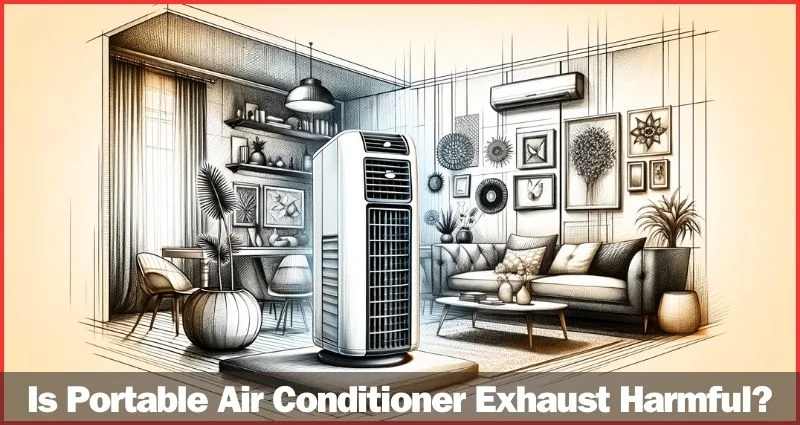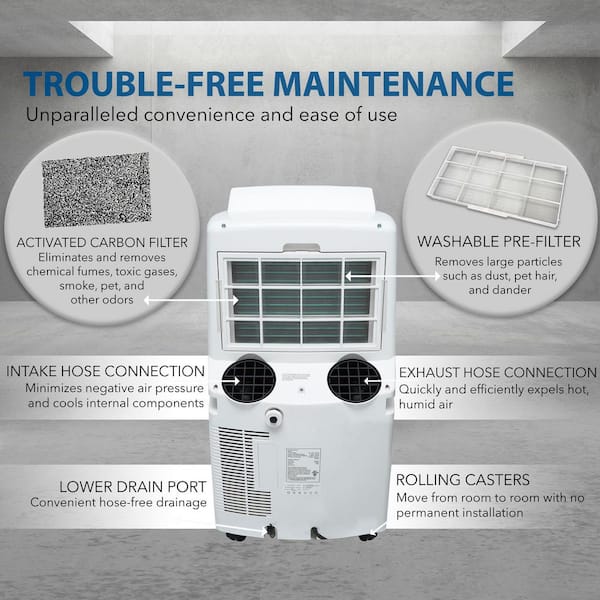Yes, the exhaust from a portable air conditioner can be harmful if not properly ventilated. The exhaust contains hot air and moisture, which can lead to the growth of mold and the release of harmful fumes.
Additionally, the hot air and moisture can increase the humidity levels in the room, creating an uncomfortable and potentially unhealthy environment. It’s important to ensure that the exhaust is directed outside or properly vented to prevent these issues.
We will discuss the potential harm caused by portable air conditioner exhaust and provide tips for safely using and venting portable air conditioners to minimize any negative impacts.
You May Like
- ANTI-CLOCKWISE UNIVERSAL FIT: Our AC exhaust hose has an anti-clockwise…
- DURABLE & WIDE COMPATIBILITY: The window vent kit for portable AC unit…
- EASY TO INSTALL: Just set the plate panels together and slide them to the…
- GOOD SEALING: There is gap between fixing plate and adjustable plate,…
- Universal Fit Size: The hose retracts to 21.5 cm/8.46″ in length and can be…
- Quick Tool-free Installation: The hose can be directly installed…
- Efficient Insulation and Energy Saving: By enhancing the insulation…
- Convenient Cleaning and Maintenance: It supports direct washing after…
- 🔥❄️❄【Good sealing】:This window kit keeps your room cool for…
- ❄️❄【Reusable】:This window sealing kit is made of PVC, which does…
- ❄️❄【Easy to install and disassemble】:Fits for sliding window or…
- ❄️❄【Adjustable lenth】:It is suitable for most vertical and…
- Universal Fit for Top Portable AC Brands – Replaces your damaged hose with…
- Adjustable from 40″ to 80″ for Any Setup – Extend up to 80 inches to…
- Reinforced for Leak-Free, Long-Term Use – Built with heavy-duty…
- Tool-Free Twist-On Installation in Seconds – Simply align the hose with…
- CLOCKWISE: Our ac hose thread is anti-clockwise and has a diameter of 5.9…
- STRONG & DURABLE: The exhaust hose is made of thickened polypropylene with…
- LONGER & 59 INCHES: Our ac hose has good telescopic function and…
- EASY TO INSTALL: Fully stretch the two ends of the exhaust hose, and slowly…
Unveiling Portable Air Conditioner Exhaust

The portable air conditioner exhaust is a crucial consideration for many users. While it releases hot air outside, the exhaust is not inherently harmful.
However, proper installation and maintenance are key to ensuring safe and efficient operation. Regular cleaning and positioning the exhaust away from sensitive areas can help mitigate any potential issues.
Understanding Exhaust Mechanisms
When using a portable air conditioner, it’s crucial to understand the function of the exhaust mechanism. The exhaust system is responsible for expelling hot air from the room to the outside environment, allowing the air conditioner to cool the space effectively.
By comprehending how this system works, users can ensure proper installation and maintenance, maximizing the unit’s efficiency.
Components Of The Exhaust
The exhaust of a portable air conditioner comprises several key components. These include the exhaust hose, the exhaust vent kit, and the window kit. The exhaust hose is connected to the air conditioner and directs the hot air outside, while the exhaust vent kit provides a seal around the hose where it exits the room.
Additionally, the window kit allows for secure attachment of the exhaust vent to the window, ensuring a tight seal to prevent hot air from re-entering the room.
In summary, understanding the exhaust mechanisms and components of a portable air conditioner is essential for proper operation and efficient cooling.
By ensuring these components are installed and maintained correctly, users can minimize the impacts of the exhaust and enjoy the benefits of a comfortable indoor environment.

Credit: www.homedepot.com
Unpacking The “is Portable Air Conditioner Exhaust Harmful?” Query
Exploring Common Concerns
When it comes to portable air conditioners, there are often concerns about the potential harm associated with their exhaust. Common questions include whether the exhaust can pose health risks, impact the environment, or affect the indoor air quality.
Analyzing The Composition Of Exhaust
Understanding the composition of the exhaust is essential in addressing the potential harm it may cause. It’s crucial to explore the components and their impact on health and the environment to assess any potential risks accurately.
Health Implications Of Ac Exhaust
When considering the topic of portable air conditioners, understanding the health implications of AC exhaust is crucial.
While these devices offer remarkable convenience, there are potential health risks associated with the expelled air. It’s essential to be mindful of both short-term effects and long-term consequences that may arise from exposure to AC exhaust.
Short-term Effects
Immediate exposure to portable air conditioner exhaust can lead to various short-term health issues. The expelled air often contains carbon monoxide, volatile organic compounds (VOCs), and other pollutants.
When inhaled, these can result in headaches, dizziness, irritation of the eyes, nose, and throat, and fatigue. Due to the limited space in which portable air conditioners operate, these short-term effects can be particularly concerning for individuals who spend prolonged periods near the exhaust.
Long-term Consequences
Prolonged exposure to AC exhaust can pose more severe health risks over time. The continuous release of harmful chemicals and potential allergens may contribute to the development of respiratory issues, exacerbated allergies, and compromised immune function.
Individuals with pre-existing respiratory conditions may experience worsening symptoms with long-term exposure to AC exhaust. Therefore, it’s important to weigh the convenience of portable air conditioners against the potential chronic health implications their exhaust may pose.
Mitigating Risks From Portable Ac Exhaust

Portable air conditioners offer convenient cooling solutions, especially in spaces without central air conditioning. However, concerns about the potential harm from the exhaust of these units have prompted a closer look at mitigating risks associated with their usage.
By implementing best practices for usage, proper ventilation, and maintenance strategies, individuals can minimize the potential negative impacts of portable air conditioner exhaust.
Best Practices For Usage
- Use in well-ventilated areas to allow for efficient heat exchange and to prevent the build-up of exhaust fumes.
- Follow manufacturer’s guidelines for installation to ensure proper function and safety.
- Avoid overworking the unit, as this can lead to increased and potentially harmful exhaust emissions.
- Regularly clean and replace filters to maintain optimal performance and minimize pollutant emissions.
- Consider using the unit during off-peak hours to minimize the impact of increased energy consumption on the environment.
Ventilation And Maintenance Strategies
Proper ventilation is essential in mitigating the risks associated with portable air conditioner exhaust. Implementing regular maintenance strategies can further reduce the potential harm from the unit’s emissions. Here are some essential ventilation and maintenance methods:
- Ensure proper window sealing to minimize the potential for outdoor pollutants to infiltrate the indoor environment.
- Direct the exhaust hose outside to prevent the recirculation of hot air and pollutants within the space.
- Regularly inspect and clean the exhaust hose to prevent blockages and maintain efficient airflow.
- Keep the unit and surrounding area clean to prevent the accumulation of dust and debris, which can impact air quality and unit performance.
- Schedule professional maintenance checks to address any potential issues and ensure the unit is operating optimally.
Air Quality And Environmental Impact
Air quality and environmental impact are crucial factors to consider when assessing the use of portable air conditioners. The impact of these units on indoor air quality and outdoor pollution is a significant consideration in understanding the overall environmental implications of their use.
Assessing Indoor Air Quality
Assessing indoor air quality is essential when evaluating the impact of portable air conditioner exhaust. While these units can effectively cool indoor spaces, they may also contribute to poor air quality due to the emission of pollutants and the potential for indoor air stagnation.
The exhaust from portable air conditioners can release harmful pollutants such as carbon monoxide, volatile organic compounds, and nitrogen dioxide, which can detrimentally impact indoor air quality and compromise the health of occupants.
Contribution To Outdoor Pollution
The contribution of portable air conditioner exhaust to outdoor pollution is a concerning aspect that must be carefully considered. The emissions from these units, such as greenhouse gases and pollutants, can potentially worsen outdoor air quality and contribute to environmental degradation.
The release of exhaust gases into the atmosphere can have implications for local air pollution and climate change, thereby affecting the overall environmental balance.
Demystifying The Truth About Ac Exhaust
Portable air conditioners are a popular choice for cooling homes and offices, especially in spaces where traditional central air conditioning systems may be impractical or costly.
However, there are often questions and concerns about the potential harm of the exhaust produced by these units. This article sets out to demystify the truth about portable air conditioner exhaust and shed light on the latest research findings.
Comparing Myths Vs. Facts
Firstly, let’s address common myths and facts about portable air conditioner exhaust to provide clarity and debunk any misconceptions surrounding its potential harm.
- Myth: Portable air conditioner exhaust releases harmful chemicals into the air.
- Fact: The exhaust primarily contains hot air and moisture, with a minimal amount of condensation and pollutants.
- Myth: AC exhaust negatively impacts indoor air quality and poses health risks.
- Fact: When properly installed and maintained, portable air conditioners with exhaust vents do not significantly affect indoor air quality and are safe for use.
- Myth: AC exhaust contributes to environmental pollution.
- Fact: While all air conditioners use electricity and indirectly contribute to environmental impact, the exhaust itself does not release harmful emissions or pollutants into the atmosphere.
Latest Research Findings
Recent studies have delved into the composition and impact of portable air conditioner exhaust, yielding valuable insights into its potential effects on indoor air quality and the environment.
One study conducted by environmental scientists compared the exhaust emissions of portable air conditioners to other common household sources of pollutants.
The findings revealed that the emissions from AC exhaust were minimal in comparison, with no significant impact on overall air quality when the unit was properly operated and maintained.
Frequently Asked Questions Of Is Portable Air Conditioner Exhaust Harmful?
Do Portable Air Conditioners Give Off Carbon Monoxide?
No, portable air conditioners do not emit carbon monoxide. They operate by using refrigerant and a fan to cool the air. It’s important to use them in well-ventilated areas to prevent any potential build-up of carbon monoxide, ensuring safe indoor air quality.
Is Exhaust From Portable Ac Toxic?
The exhaust from portable ACs can release toxic gases, including carbon monoxide and other pollutants. It’s essential to use these units in well-ventilated areas to minimize health risks. Regular maintenance and proper installation can also help reduce the potential for toxic emissions.
Is It Safe To Use A Portable Air Conditioner Without An Exhaust Hose?
No, it’s not safe to use a portable AC without an exhaust hose, as it releases hot air. This can lead to overheating and decreased efficiency. It’s important to use the exhaust hose to vent out hot air.
Are Portable Air Conditioners Safe To Breathe?
Yes, portable air conditioners are safe to breathe. They filter the air and remove allergens and pollutants, improving air quality. However, proper maintenance and regular cleaning of filters are crucial to ensure safe breathing. Regular maintenance is important for the overall performance of the air conditioner system.
Conclusion
Portable air conditioner exhaust can be harmful if not properly maintained. It’s important to regularly clean and replace filters to reduce the risk of air pollution. Additionally, ensuring proper ventilation and using outdoor exhaust options can minimize indoor air contamination.
Prioritizing these measures can help promote a healthier living environment.





